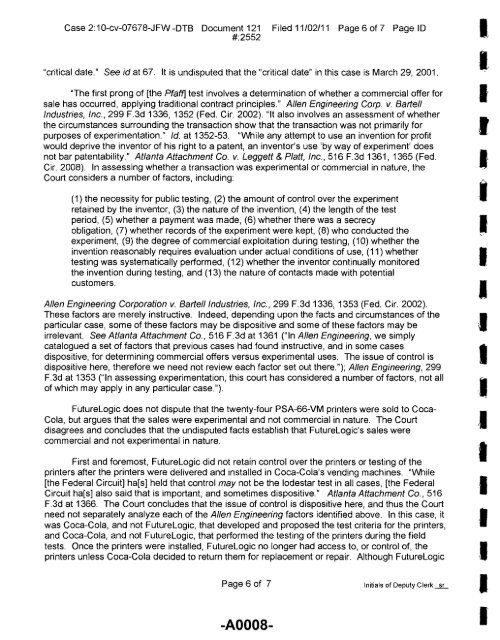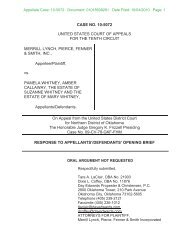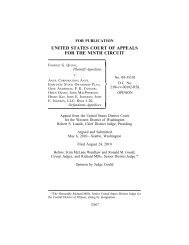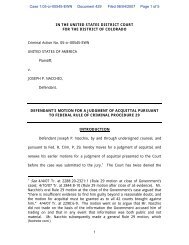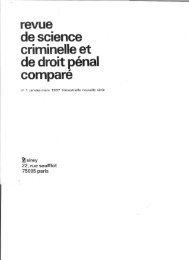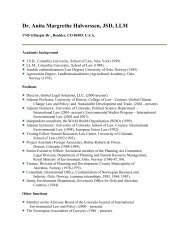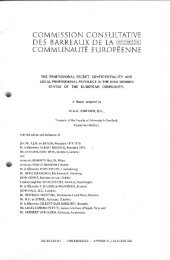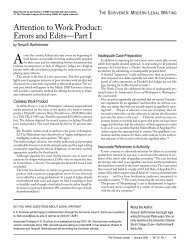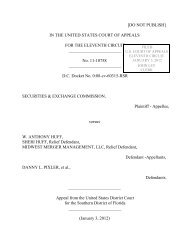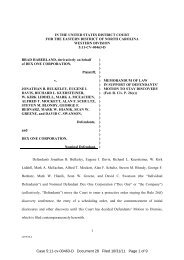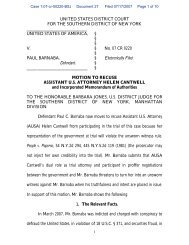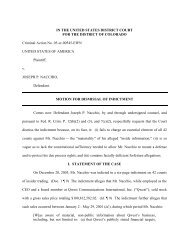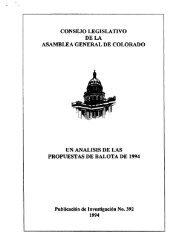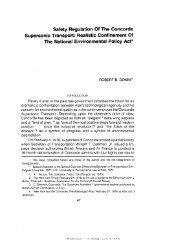- Page 1 and 2: IJllJl IIIIIIII IIII IIIII IIII III
- Page 3 and 4: ! "l I ! ! I I i I I I I l I I I 1
- Page 5 and 6: ,I i i I I I I ! I 1 I I i I I I I
- Page 7 and 8: I i i I I I I I I I i I I ! I i I I
- Page 9: ! ,i l I I ii, I I 1 I 1 i I I I i,
- Page 13 and 14: ! I ! ! I ! I I I I I I I Case No.
- Page 15 and 16: I I I I I I I I I I ! I, I I ! I !
- Page 17 and 18: I i I ! ! I I I, I I ! I i ! I I I
- Page 19 and 20: I I I I ! I I I I ! i I I CM/ECF -
- Page 21 and 22: ! ! i i N t, Ii I I, l, ! !1 l I I
- Page 23 and 24: I i I i ! I I ! I I I ! I I I i ! i
- Page 25 and 26: il II I i It ! I ! ! ,11 I i i i !
- Page 27 and 28: ! I I I I ! I I I I I I I I I I I I
- Page 29 and 30: I i I I I ! i i ! , CM/ECF - Califo
- Page 31 and 32: I I I . I | I I l I I I I i I I I i
- Page 33 and 34: I i I I I i I i I I I I I I I I i !
- Page 35 and 36: U,S, I'ATENT DOCUMENTS ,1,910,672 A
- Page 37 and 38: U'S. Patent Sep 29, 2009 C3 tD O Sh
- Page 39 and 40: U.S. Patent Sep. 29, 2009 Sheet 4 o
- Page 41 and 42: U,S. Patent Sel). 29, 2009 Sheet 6
- Page 43 and 44: U.S. Patent Sep. 29, 2009 Sheet 8 o
- Page 45 and 46: MICrilOI) AND AIWAllATUS I;OR GAMIN
- Page 47 and 48: enabled gaming machine uses a bill
- Page 49 and 50: prit'ltcr to select the type, quant
- Page 51 and 52: 13 30. Tile promotional printer ofc
- Page 53 and 54: ! i I I g ! I I I I I I I I I I I I
- Page 55 and 56: i I I I I I I I I I I I I I I I I I
- Page 57 and 58: Case 2:10-cv-07678-JFW-DTB Document
- Page 59 and 60: Case2:10-cv-07678-JFW-DTB Document
- Page 61 and 62:
Case2:10--cv-07678-JFW-DTB Document
- Page 63 and 64:
Case 2:10-cv-07678-JFW-DTB Document
- Page 65 and 66:
Case 2:10-cv-07678-JFW-DTB Document
- Page 67 and 68:
• Case 2:10-cv-07678-JFW-DTB Docu
- Page 69 and 70:
Case2:10-cv-07678-JFW-DTB Document
- Page 71 and 72:
• Case2:10-cv-07678-JFW-DTB Docum
- Page 73 and 74:
• Case 2:10-cv-07678-JFW-DTB Docu
- Page 75 and 76:
Case 2:10-cv-07678-JFW-DTB Document
- Page 77 and 78:
Case 2:10-cv-07678-JFW-DTB Document
- Page 79 and 80:
Case 2:10-cv-07678-JFW-DTB Document
- Page 81 and 82:
Case 2:10-cv-07678-JFW-DTB Document
- Page 83 and 84:
,_Case2:10-cv-O7678-JFW-_B Document
- Page 85 and 86:
• Case2:10-cv-07678-JFW-DTB Docum
- Page 87 and 88:
Case 2:10-cv-07678-JFW-DTB Document
- Page 89 and 90:
Case2:10-cv-07678-JFW-DTB Document1
- Page 91 and 92:
Case2: i0-cv-07678-JFW-DTB Document
- Page 93 and 94:
Case2: 10-cv-07678-JFW-DTB Document
- Page 95 and 96:
i0 ii 12 13 14 15 16 17 18 19 2O 21
- Page 97 and 98:
Case :.):10-cv-07678-J FW -DTB 5 6
- Page 99 and 100:
Case 1 2 3 4 5 6 7 8 9 10 11 12 13
- Page 101 and 102:
Case 2 10-cv-07678-JFW -DTB 1 2 3 4
- Page 103 and 104:
Case 2 10-cv-07678-JFW-DTB Document
- Page 105 and 106:
Case 2 10-cv-07678-JFW -DTB 5 6 7 8
- Page 107 and 108:
Case 2 10-cv-07678-JFW-DTB 1 2 3 4
- Page 109 and 110:
Cas( 1 2 3 4 5 6 7 8 9 10 11 12 13
- Page 111 and 112:
Gas( 1 2 3 4 5 6 7 8 9 10 11 12 13
- Page 113 and 114:
Cas( 1 2 3 4 l0 1l 5 6 7 8 9 12 13
- Page 115 and 116:
Cas{, 2:10-cv-O7678-JFW -DTB 1 2 3
- Page 117 and 118:
Cas_ 1 2 3 4 5 6 7 8 9 10 11 12 13
- Page 119 and 120:
Cas_ 1 2 3 4 5 6 7 8 9 10 11 12 13
- Page 121 and 122:
Cas( 1 2 3 4 5 6 7 8 9 10 11 12 13
- Page 123 and 124:
I l I I I I I I i ! I I i I I I I I
- Page 125 and 126:
Case 2:1 FW-DTB Document 56 Filed 0
- Page 127 and 128:
I I I ! i I I I I I I I I I I I I I
- Page 129 and 130:
I I I I i I I I I I I I i I I I I I
- Page 131 and 132:
I I I I I I I I I I I I I I I I I I
- Page 133 and 134:
I I I I I I I I I I I I I ! i ! 1 I
- Page 135 and 136:
Case 1 2 3 4 5 6 7 8 9 l0 11 12 13
- Page 137 and 138:
Case 1 2 3 4 5 6 7 8 9 10 11 12 13
- Page 139 and 140:
Case 1 2 3 4 5 6 7 8 9 10 11 12 13
- Page 141 and 142:
Case 1 2 3 4 5 6 7 8 9 10 11 12 13
- Page 143 and 144:
5 6 7 8 9 10 11 12 13 14 15 16 17 1
- Page 145 and 146:
Case 2:10-cv-O7678-JFW-DTB Document
- Page 147 and 148:
,Case 2:10-cv-07678-JFW-DTB Documen
- Page 149 and 150:
Case 2:10-cv-07678-JFW-DTB Document
- Page 151 and 152:
Case 2:10-cv-O7678-JFW-DTB Document
- Page 153 and 154:
Case 2:10-cv-07678-JFW-DTB Document
- Page 155 and 156:
Case 2:10-cv-O7678-JFW-DTB Document
- Page 157 and 158:
• Case 2:10-cv-07678-JFW-DTB Docu
- Page 159 and 160:
Case 2:10-cv-07678-JFW-DTB Document
- Page 161 and 162:
- Case 2:10-cv-07678-JFW-DTB Docume
- Page 163 and 164:
I I I I I I I I I I I I I I I I I I
- Page 165 and 166:
Case 2:10-cv-07678-J FW -DTB Docume
- Page 167 and 168:
Case 2:10-cv-07678-JFW-DTB Document
- Page 169 and 170:
Case 2:10-cv-07678-JFW-DTB Document
- Page 171 and 172:
Case 2:10-cv-07678-JFW-DTB Document
- Page 173 and 174:
Case 2:10-cv-O7678-JFW -DTB UN/TED
- Page 175 and 176:
Case 2:10-cv-07678-JFW-DTB Document
- Page 177 and 178:
Case 2:10-cv-07678-JFW-DTB Document
- Page 179 and 180:
Case 2:10-cv-07678-JFW-DTB Document
- Page 181 and 182:
Case 2:10-cv-O7678-JFW-DTB Document
- Page 183 and 184:
Case 2:10-cv-07678-JFW -DTB Documen
- Page 185 and 186:
Case 2:10-cv-O7678-JFW-DTB Document
- Page 187 and 188:
Case 2:10-cv-07678-JFW -DTB Documen
- Page 189 and 190:
Case 2:10-cv-O7678-JFW-DTB Document
- Page 191 and 192:
Case 2:10-cv-07678-J FW -DTB Docume
- Page 193 and 194:
case 2:lO_cv-O7678"3FW .03"B Docume
- Page 195 and 196:
Case 2:10-cv-07678-J FW -DTB Docume
- Page 197 and 198:
Case 2:10-cv-O7678-JFW -DTB Documen
- Page 199 and 200:
Case 2:10-cv-07678-JFW-DTB Document
- Page 201 and 202:
I I I I I I I I I I I I I I I I I I
- Page 203 and 204:
I i I I I I I I I I I I I i I I I I
- Page 205 and 206:
I I I I I I I I I I I I I I I I I I
- Page 207 and 208:
I I I I I I I I i I I I I I i I I I
- Page 209 and 210:
i I I I I I I I I I I I I I I I I I
- Page 211 and 212:
I I I I I I I I I I I I I I I I I I
- Page 213 and 214:
I I I I I I I I I I I I I I I I I I
- Page 215 and 216:
I Case 2:10-cv-07678-JFW-DTB Docume
- Page 217 and 218:
I I I I I I I I I I I I I I I I I I
- Page 219 and 220:
I I l I l I I I I I I I l I i I I I
- Page 221 and 222:
I Ii Case 2:10-cv-07678-JFW-DTB Doc
- Page 223 and 224:
I I I, ! i I l I il l I i. I ! ! I
- Page 225 and 226:
I I i i I I l I I i i i I I I | I I
- Page 227 and 228:
I I i i ! I 1 Case 2:10-cv-07678-JF
- Page 229 and 230:
I i i i I | I i I I ! I I I I i I I
- Page 231 and 232:
I Case 2:10-cv-07678-JFW-DTB Docume
- Page 233 and 234:
I ! I I I i Case 2:10-cv-07678-JFW-
- Page 235 and 236:
Case 2:10-cv-O7678-JFW-DTB Document
- Page 237 and 238:
I_r I I I | i ! i i I | I I i I I !
- Page 239 and 240:
i I !J m il I I i I I i Case 2:10-c
- Page 241 and 242:
! ! ! 4.a I II I ii i I II i I I II
- Page 243 and 244:
I i i I ! ! I ! i I Ii II i ! ! ! I
- Page 245 and 246:
Case_2M-_7673-_ F_:_'_r'fT15--Dt_om
- Page 247 and 248:
! ,I i I I I I Case2,_I0;_76_FW-=DT
- Page 249 and 250:
I I I I I I I I \ I i 00107 -A0246-
- Page 251 and 252:
I I ! Case 2:10-cv-O7678-JFW -DTB D
- Page 253 and 254:
I I i ! i I 1 I I 1 I I I I I I I I
- Page 255 and 256:
Case 2:10-cv-07678-JFW-DTB Document
- Page 257 and 258:
I I I I 1 I I I I l I I I I i I I i
- Page 259 and 260:
I I I I i ! I I I i I I I I I I I I
- Page 261 and 262:
I I I I i I I I I I I I I I I I I i
- Page 263 and 264:
II I I I i i I II li I II i I I I i
- Page 265 and 266:
I I I I I I I I I I I I I I I I l I
- Page 267 and 268:
I I I I I I I I i l I I I I I I I I
- Page 269 and 270:
I I I I I I l I I i l I I I I I I I
- Page 271 and 272:
I Case 2:10-cv-07678-JFW-DTB Docume
- Page 273 and 274:
I Case 2:10-cv-07678-JFW-DTB Docume
- Page 275 and 276:
I • Case 2:10-cv-07678-JFW-DTB Do
- Page 277 and 278:
I I I I I I I I I I I I I I I I I I
- Page 279 and 280:
I Case 2:10-cv-O7678-JFW-DTB Docume
- Page 281 and 282:
I I I I I I I I i I I I I I I I I I
- Page 283 and 284:
I I I I I I I I I I I I I I I I I I
- Page 285 and 286:
I ,; I I I I I I I I I I I I I I I
- Page 287 and 288:
I I I I I I I I I I I I I I I I I I
- Page 289 and 290:
| I I I I I I I I I Case 2:10_cv-07
- Page 291 and 292:
I I I I I I I I I I I I I I I _.,,_
- Page 293 and 294:
I I I I I ! I I ! i I i I i I i i i
- Page 295 and 296:
I I I I ! I I I I I I I ! I I I i I
- Page 297 and 298:
From: Sent: To: ' CC: Subject: Scot
- Page 299 and 300:
I i I I I i I I I I I I I I I I ! I
- Page 301 and 302:
I i I I I I I i I I i I I I I I I I
- Page 303 and 304:
I I I I I i I I i I I I I I i I ! I
- Page 305 and 306:
I I i I i i ! I I I I I I I I I I I
- Page 307 and 308:
I I I I i i I 1 I I i I I ! t 1 I I
- Page 309 and 310:
I I I I I I I I I I I I I I I I I I
- Page 311 and 312:
I I I i I I I ! l I I I I I l I I I
- Page 313 and 314:
I I I I I I I I I ! I I I I i I i l
- Page 315 and 316:
! I I i I I ! I I I I I I I I I I I
- Page 317 and 318:
! I I i I I I I I I I i I I i i I l
- Page 319 and 320:
I I I i I I I I I i I I I I I I I I
- Page 321 and 322:
Case 2:" O-cv-07678-JFW-DTB Documen
- Page 323 and 324:
Case 2: 1 2 3 4 5 6 7 8 9 10 11 12
- Page 325 and 326:
Case 2 10-cv-07678-JFW -DTB 5 6 7 8
- Page 327 and 328:
Case 2 10-cv-07678-JFW -DTB 1 2 3 4
- Page 329 and 330:
Case 2 10-cv-07678-JFW -DTB .5 2 3
- Page 331 and 332:
Case 2 10-cv-O7678-JFW-DTB 5 6 7 8
- Page 333 and 334:
I I I I I I I I I I i I I I I I I I
- Page 335 and 336:
I I I I I I I I I i I I I I I I I I
- Page 337 and 338:
Case ; l 2 3 4 5 6 7 8 9 t0 11 12 1
- Page 339 and 340:
Case l 2 3 4 5 6 7 8 9 tO ] 1 12 13
- Page 341 and 342:
Case ", :10-cv-07678-JFW-DTB Docume
- Page 343 and 344:
1 2 3 4 5 6 7 8 9 10 11 12 13 14 15
- Page 345 and 346:
Case 2 1 2 3 4 5 6 7 8 9 t0 t 1 12
- Page 347 and 348:
Case 2 1 2 3 4 5 6 7 8 9 t0 11 12 1
- Page 349 and 350:
Case 2 1 2 3 4 5 6 7 8 9 10 I1 12 1
- Page 351 and 352:
! I I I I I I I I I I I I I I I I i
- Page 353 and 354:
I I I I I I I I I I I ! i i I I I I
- Page 355 and 356:
I I I I I I I I ! I I I I I I i I I
- Page 357 and 358:
I I I I I I I I I I I I I I I I I !
- Page 359 and 360:
I I I 1 I I I I I I I I I I I I I I
- Page 361 and 362:
I I I I I I i ! I I I I t I i I I I
- Page 363 and 364:
I I ! I I I I I I I I I I I I I I I
- Page 365 and 366:
Cas 1 2 3 4 5 6 7 8 9 10 11 12 13 1
- Page 367 and 368:
Cas_ 1 2 3 4 5 6 7 8 9 10 11 12 13
- Page 369 and 370:
Cas, ._2:10-cv-07678-J FW -DTB 5 6
- Page 371 and 372:
Cas, 2:10-cv-07678-JFW-DTB l 2 3 4
- Page 373 and 374:
Case 2:10-cv-07678-JFW-DTB Document
- Page 375 and 376:
Case 2:10-cv-O7678-JFW -DTB 1 2 3 4
- Page 377 and 378:
Cas_ 2:10-cv-07678-J FW -DTB 5 6 7
- Page 379 and 380:
Cas_ 2:10-cv-07678-J FW -DTB 1 2 3
- Page 381 and 382:
Case 2:10-cv-07678-J FW -DTB 1 2 3
- Page 383 and 384:
Case 2:10-cv-07678-JFW -DTB 1 2 3 4
- Page 385 and 386:
Case 2:10-cv-07678-J FW -DTB 5 6 7
- Page 387 and 388:
Case 2:10-cv-07678-J FW -DTB 5 6 7
- Page 389 and 390:
Cas_ 2:10-cv-07678-J FW -DTB l0 ll
- Page 391 and 392:
Case 2:10-cv-O7678-JFW -DTB 5 6 7 8
- Page 393 and 394:
Case 1 2 3 4 5 6 7 8 9 10 11 12 13
- Page 395 and 396:
Case 2:10-cv-07678-J FW -DTB 5 6 7
- Page 397 and 398:
Case 2:10-cv-07678,J FW -DTB 3 4 5
- Page 399 and 400:
Case 1 2 3 4 5 6 7 8 9 10 11 12 13
- Page 401 and 402:
Case 1 2 3 4 5 6 7 8 9 10 11 12 13
- Page 403 and 404:
Case _>: 10-cv-07678-JFW -DTB l0 11
- Page 405 and 406:
Case 1 2 3 4 5 6 7 8 9 10 11 12 13
- Page 407 and 408:
Case __: 10-cv-07678-JFW -DTB 9 10
- Page 409 and 410:
Case 2:10-cv-07678-JFW -DTB 5 6 7 8
- Page 411 and 412:
Case __: 10-cv-07678-JFW -DTB 10 11
- Page 413 and 414:
Case 2:10-cv-07678-J FW -DTB 5 6 7
- Page 415 and 416:
Case ._:10-cv-07678-JFW -DTB 5 6 7
- Page 417 and 418:
Case __: 10-cv-07678-JFW -DTB 7 8 9
- Page 419 and 420:
Case __: 10-cv-07678-JFW -DTB 8 9 1
- Page 421 and 422:
Case __: 10-cv-O7678-JFW -DTB 10 11
- Page 423 and 424:
Case _):10-cv-07678-JFW -DTB 5 6 7
- Page 425 and 426:
Case 1 2 3 4 5 6 7 8 9 10 11 12 13
- Page 427 and 428:
Cas_, 2:10-cv-O7678-J FW -DTB 7 8 9
- Page 429 and 430:
Cas, 1 2 3 4 5 6 7 8 9 10 11 12 13
- Page 431 and 432:
Cas{ 2:10-cv-07678-JFW -DTB ] 2 3 4
- Page 433 and 434:
Cas_, 2:10-cv-O7678-JFW-DTB Documen
- Page 435 and 436:
Case, 2:10-cv-07678-JFW -DTB 1 2 3
- Page 437 and 438:
CONFIDENTIAL Case2:10-cv-07678-JFW-
- Page 439 and 440:
Case 2:10-cv-07678-JFW-DTB Document
- Page 441 and 442:
I I I I I I I I I I I I I I I I I I
- Page 443 and 444:
Case 2:10-cv-07678-JFW-DTB Document
- Page 445 and 446:
I I I I I I I I I I I I I I I I I C
- Page 447 and 448:
i I I I i I I I I I I I I I I I I I
- Page 449 and 450:
; , .;,_JCase2:10-c@07678-JFWLDTB D
- Page 451 and 452:
I I I I I I I I I I I I I I I I I I
- Page 453 and 454:
I I I I I I I I I I I I I I I I I I
- Page 455 and 456:
Case 2:10-cv-07678-JFW -DTB Documen
- Page 457 and 458:
Case 2:10-cv-O7678-JFW-DTB Document
- Page 459 and 460:
Case 2:10-cv-O7678-JFW -DTB User: E
- Page 461 and 462:
Case 2:10-cv-O7678-JFW-DTB Document
- Page 463 and 464:
I I I I I I ! I i I I I I I i I I I
- Page 465 and 466:
! ! ! ! ! I, ! i ! I I ! I I i I i
- Page 467 and 468:
I i i I , I I I l i I I I i i I I i
- Page 469 and 470:
Case2:10-cv-07678-JFW-DTB Document6
- Page 471 and 472:
l l I I ! i I I l l l l I I l i l i
- Page 473 and 474:
I I I I I I I I i I i I I I I I I I
- Page 475 and 476:
I I I l I I I I I I I I I I i I I I
- Page 477 and 478:
I Case 2:10-cv-07678-JFW-DTB Docume
- Page 479 and 480:
CBs( 1 2 3 4 5 6 7 8 9 10 11 12 13
- Page 481 and 482:
Cas_ l 2 3 4 5 6 7 8 9 l0 II 12 13
- Page 483 and 484:
Cas_ l. 2 3 4 5 6 7 8 9 10 11 12 13
- Page 485 and 486:
I I I I I I I I I I I I I I I I I I
- Page 487 and 488:
I I I I I I I I I I I I I I I I I I
- Page 489 and 490:
I I I I I I I I I I I I I I I I I I
- Page 491 and 492:
Cas 19 1 2 3 4 5 6 7 8 9 10 11 12 1
- Page 493 and 494:
Casl 1 2 3 4 5 6 7 8 9 10 11 12 13
- Page 495 and 496:
From: Sent: To: Subject: Eric, Case
- Page 497 and 498:
CONFIDENTIAL Case 2:10-cv-07678-JFW
- Page 499 and 500:
2011-tQ-06 14;36 ^t|a_ta Socia|LLC
- Page 501 and 502:
Case 2 10-cv-07678-JFW-DTB 5 6 7 8


